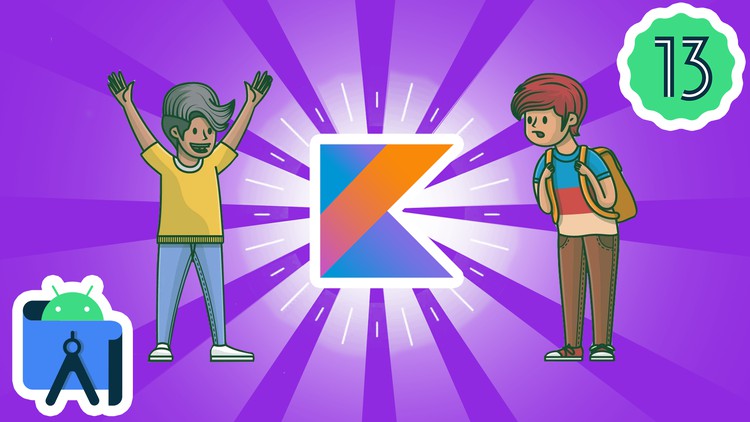
Certificated Android App Development with Kotlin 2023 ! Learn Kotlin in 10 Hours and write you own applications | Course
What you will learn
Android Studio UI
Kotlin Programming
Learn Android User Interface Widgets
ViewBinding using Kotlin
Creating Example Applications
Creating Various Android Applications
Setting Up AVD
Anatomy of Android Application
Object Oriented Programming
Various Variable Types in Kotlin
Code Advanced Functions Using Kotlin
and other awesome topics ->
Description
Kotlin is the most popular programming language for building Android apps and it can also be can be used for any kind of development.
Are you trying to start a career in Android programming, but haven’t found the right way in? Do you have a great idea for an app, but don’t know how to make it a reality? Or maybe you’re just frustrated that to learn Android, you must already know Kotlin. If so, then this course is for you
Quickly putting together a prototype of an idea, refining it, and then deciding to run with it and wire it up into a fully-fledged app, is such an exciting and rewarding process. Any programming can be fun – I have been programming all my life – but creating for Android is somehow extraordinarily rewarding..
Kotlin is the most succinct language, and therefore is the least error-prone, which is great for beginners. Kotlin is also the most fun language, mainly because the succinctness means you can get results faster and with less code. Google considers Kotlin an official (first-class) Android language. There are some other advantages to Kotlin that make it less error-prone and less likely to make mistakes that cause crashes. We will discover the details of these advantages as we proceed.
Kotlin is an object-oriented language. This means that it uses the concept of reusable programming objects. If this sounds like technical jargon, another analogy will help. Kotlin enables us and others (like the Android API development team) to write code that can be structured based on real-world things, and here is the important part – it can be reused.
Kotlin remains one of the most widely used and fastest-growing programming languages in recent years. Developers across the globe prefer using Kotlin for a range of projects such as data science, server-side or cloud development, etc. The demand for Kotlin is on the rise and it will continue to grow in the years to come. In this post, let’s explore the top five reasons why Kotlin is a great programming language to learn in 2021.
1. Modern language
It is a modern programming language that brings together the best of object-oriented and functional programming. Some of the most promising features of Kotlin include clean compact syntax, secure, general-purpose, and more.
2. Great materials
There are ample materials available on Kotlin that learners can leverage to have a good grasp of the programming language. There are numerous courses that a beginner can start with. Most of these courses are self-paced and offer great insights into the programming language. Also, the developer community is quite huge so if learners get stuck or have queries they can always seek solutions from the developer community.
3. Easy to learn
Kotlin’s syntax is easy to learn for beginners and it offers a host of powerful features. It can be a great language to upskill for experienced programmers. It has a shallow learning curve especially if you have experience in Python or Java. The programming language is also quite easy for iOS developers as it is based on familiar concepts of modern technology.
4. Career prospects
Many leading brands use Kotlin for their software and Kotlin skills are highly in demand. If estimates are to be believed, job postings related to Kotlin skills are skyrocketing since 2017 by 1400%.
5. Community support
Kotlin is an open-source language and has a strong community of developers. There are over 200 Kotlin user groups, over 37,000 Kotlin slack users, and thousands of other members. The community support is huge in Kotlin and it is constantly growing.
Content